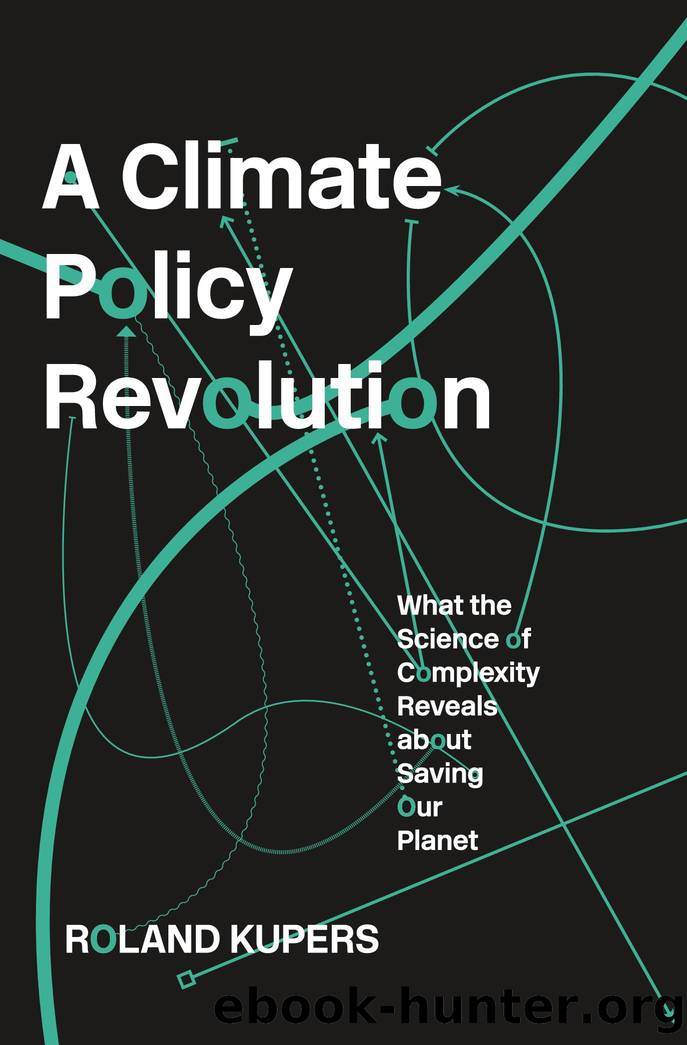A Climate Policy Revolution by Roland Kupers

Author:Roland Kupers
Language: eng
Format: epub
Publisher: Harvard University Press
Locked In before You Know It
The early success of Tesla illustrates how incumbent car companies are unlikely to succeed at electric cars. Sure, it may be too early to call this particular race, as every other car company announces ambitious plans to make electric cars. But based on everything we have seen before and described above, they are likely to struggle with numerous soft barriers. The different engineering approach with an order of magnitude fewer parts than internal combustion engines, their historic supply chain relationships, the network of dealers that depend on repairs and maintenance—all conspire to make it implausible that most of them can catch up with Tesla. The stock market appears to know that too.
However, for all its remarkable innovation, it is also possible that Tesla is already locked into a model of individual car ownership. The revolution in mobility we’ll look at in Chapter 12, one of collectively owned super-lightweight autonomous vehicles, may plausibly already be out of reach for Tesla. Time will tell.
Companies are locked into more than their own business model; they are also locked into the larger system of consumption. As we have seen in Chapter 9, the design of the institutions and policy frameworks conspire to increase our addiction to ever-increasing consumerism, well past the point of optimal utility—or even pleasure. Yet just as one can’t blame fish for the ocean being wet, one can’t blame companies for consumerism. It’s the ecosystem they are in that makes them do it. In dealing with the climate crisis there is a great deal of finger-pointing and demonization, including of companies. According to the Carbon Disclosure Project, “Since 1988, a mere 100 companies have been responsible for 71 percent of the entire world’s industrial greenhouse gas emissions.”13 Convenient, but misleading. The implication is that if I leave the heating on and the windows open, the ensuing carbon emissions are the fault of the power company. Absurdly reductionist. Looking at the economic system as a complex system, it becomes clear that the behavior of companies is consistent with the design of the economic system. The economy is not a natural system, but one with man-made institutions and choices. Just as individuals’ norms coevolve with their environment, so do companies.
This doesn’t mean that corporate responsibility is a hopeless idea. Companies should be pushed to act as responsibly as possible, within the ocean they swim in. There are enormous improvements that can be made within the status quo. Reducing waste, designing for recyclability, energy efficiency, using renewable power, and implementing biodiversity policies are all areas where business could and should make valuable contributions. PWC’s Chief Purpose Officer Shannon Schulyer puts it this way: “It’s how you connect purpose to an individual so they know what they need to do in their roles and how do you help them see personally how they connect with values and behaviors.”14 The thinly veiled purpose is to keep staff on board within the current business model, rather than exploring what the broader context requires.
Download
This site does not store any files on its server. We only index and link to content provided by other sites. Please contact the content providers to delete copyright contents if any and email us, we'll remove relevant links or contents immediately.
The Secret History by Donna Tartt(16623)
The Social Justice Warrior Handbook by Lisa De Pasquale(11489)
Thirteen Reasons Why by Jay Asher(7788)
This Is How You Lose Her by Junot Diaz(5772)
Weapons of Math Destruction by Cathy O'Neil(5037)
Zero to One by Peter Thiel(4824)
The Myth of the Strong Leader by Archie Brown(4789)
Promise Me, Dad by Joe Biden(4447)
Beartown by Fredrik Backman(4418)
Stone's Rules by Roger Stone(4415)
How Democracies Die by Steven Levitsky & Daniel Ziblatt(4398)
The Fire Next Time by James Baldwin(4342)
100 Deadly Skills by Clint Emerson(4077)
A Higher Loyalty: Truth, Lies, and Leadership by James Comey(4032)
Rise and Kill First by Ronen Bergman(4012)
The David Icke Guide to the Global Conspiracy (and how to end it) by David Icke(3881)
The Farm by Tom Rob Smith(3872)
Secrecy World by Jake Bernstein(3782)
The Doomsday Machine by Daniel Ellsberg(3731)
